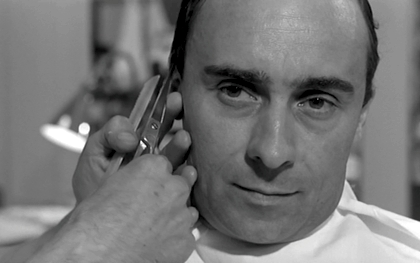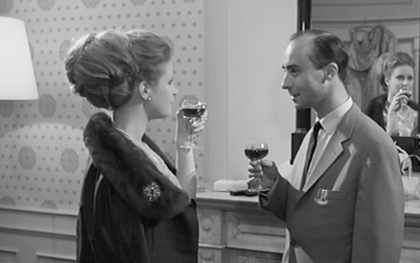Lost and found: The Man Who Had His Hair Cut Short

Tony Rayns welcomes the revival of a forgotten Belgian classic from the 1960s
Govert Miereveld (Senne Rouffaer), a middle-aged lawyer, married with two kids, is already late for the graduation ceremony at the high school for girls where he teaches. But he impulsively gets off the tram to visit his barber for a haircut he doesn’t really need. He takes the full treatment: steam-cleaning, targeted blow-drying, even a vibro-massage. When it’s finished, cued by the cadaverous barber, he says he feels wonderful. But his mind is elsewhere, lost in his masochistic obsession with the graduating pupil Fran Veenman, and the haircut mysteriously resonates with his glimpse of a bowl of rotting fruit as he left home. Govert, in fact, is a man heading for a major crack-up. Soon after the ceremony – at which he once again fails to confess his love to the oblivious Ms Veenman – he quits his jobs for a humble post as a clerk of court. And then his involuntary attendance at an autopsy pushes him right over the edge…
In the ‘different country’ that was the 1960s, André Delvaux’s debut feature The Man Who Had His Hair Cut Short (De Man die zijn Haar Kort Liet Knippen) was an art-cinema landmark. Its appearance in the 1966 London Film Festival won it that year’s Sutherland Trophy (for “the most original and imaginative film premiered at the National Film Theatre during the year”) and it went on to have a modestly successful run at the Paris Pullman, a legendarily uncomfortable arthouse in Kensington, before touring the BFI’s new regional film theatres and the network of film societies. It had already picked up prizes in three European festivals focused on ‘new cinema’ (Hyères, Pesaro, Mannheim), and went on to earn fifth place in Cahiers du cinéma’s Ten Best list for 1966 after a long run in Paris. But the film vanished from distribution – and from most accounts of modern cinema – until its recent revival on DVD with multi-lingual subtitle options in the Belgian Cinémathèque’s excellent series Chronicle of Flemish Film.
Delvaux (1926-2002) went on to other successes, some in Flemish, some in French, one – a documentary feature about Woody Allen – in English, but never quite matched the impact of his first feature. The Man Who Had His Hair Cut Short was based on an ‘unfilmable’ stream-of-consciousness novel by the Flemish writer and film critic Johan Daisne. Delvaux came to it from a very productive career in arts documentaries for television: a ‘behind the scenes’ film on Jacques Demy’s Les Demoiselles de Rochefort brought him into contact with the French film industry luminaries (cinematographer Ghislain Cloquet, sound mixer Antoine Bonfanti, editor Suzanne Baron) who came to Belgium to work on The Man Who…, and a series on Polish cinema led him to cast Beata Tyszkiewicz (at the time, wife of Andrzej Wajda) as Fran, despite the need to dub her speaking and singing voices into Flemish. But Delvaux found his other key collaborator closer to home. The film’s ineffably haunting score is by the Belgian composer Frédéric Devreese, who rooted it in his and Delvaux’s shared love of The Threepenny Opera and the other Weill-Brecht Weimar musicals.
It’s easy to agree with the late Tom Milne that “admirers of Bosch, Breughel, Ghelderode and the Flemish genius for finding horror and beauty hand-in-hand” will find the film magical from start to finish (as he wrote in the BFI’s Monthly Film Bulletin, the ancestor of S&S’s review pages). But it’s harder to pinpoint what exactly makes the film still so potent. There’s no doubt that it’s partly a brilliant directorial sleight-of-hand. Delvaux anchors the entire film in Govert’s increasingly disordered consciousness, so that the viewer is inexorably drawn into the character’s hopes and fears, joys and humiliations – but reveals that he’s been doing so only in the closing scenes. Most of the film plays like a realist drama, albeit one with some disquieting turns and unusual emphases. The closing scenes knit everything together, showing how the very elements which kept us intrigued and sometimes faintly baffled are all intimately connected in Govert’s mind. We finally understand – and it’s an emotional realisation more than an intellectual one – that it all makes sense to the paranoid Govert. The satisfaction of narrative closure is one and the same thing as empathy with the workings of a delusional, schizophrenic mind.

There are obvious echoes of Delvaux’s strategy in a recent movie like Inception, but Christopher Nolan’s attempt to give a CGI blockbuster a measure of conceptual complexity is all smoke and mirrors alongside the simplicity and directness of The Man Who Had His Hair Cut Short. Delvaux had a big advantage: he was working at a time when the battle for grown-up filmmaking was active and vital. He made this debut feature only a few years after the premieres of Last Year in Marienbad and the early films by Godard, Truffaut and Rivette, and even sooner after ‘controversial’ masterpieces from Bergman (The Silence), Fellini (8½) and Antonioni (L’eclisse). He had to make the film very cheaply (funding came from the Ministry of Culture, with a boost from Belgian television) and was rewarded with a tirade of abuse from Belgian critics, most of them deriding the very idea that a film might have sophisticated ambitions. It took success abroad to change perceptions of the film at home: it was finally released theatrically in Belgium in March 1967, more than a year after its first showing on television.
The DVD edition sketches this history and has some very useful extras, but it can’t recapture the cultural climate in which the film first appeared. In the mid-1960s, while critical wars were being fought over the merits of some ‘authors’ in Hollywood and other commercial film industries, a generation of European directors was busy reinventing what narrative cinema could be. André Delvaux was briefly up there with the best of them, and his provocative, infinitely poignant film brings back the excitement of that moment. In short, reader, it stands up well and shouldn’t be forgotten again.
What the papers said
“Some seemed to think that it might be as profound as it comes on… This reviewer agreed with the majority, who seemed to think it was a pretentious bore. The only things of interest were Miss Tyszkiewicz, who is a tasty dish, and two sequences: a chilling autopsy and the haircut of the title (which didn’t seem to have much to do with the rest of the picture).”
— Variety, 28 September 1966
“The most extraordinary achievement of Delvaux’s film is that he manages to suggest visually the metaphysical overtones spelled out in the novel. He does it mainly by being extremely simple and selective.”
— Richard Roud, Sight & Sound, Spring 1967
See also
Double Take reviewed by Jonathan Romney (April 2010)
Riding the wave: Six renowned directors from around the world on what the French New Wave meant to them (May 2009)
Private Property reviewed by Ginette Vincendeau (May 2008)
Weight of water: the Dardennes brothers talk to Jonathan Romney (April 2006)
Paris match: Geoffrey Nowell-Smith on Godard, Cahiers du cinéma and the French New Wave (June 2001)
In All Innocence reviewed by Philip Kemp (May 2000)
Keeping a distance: Janet Bergstrom on Chantal Akerman’s innovations (November 1999)



